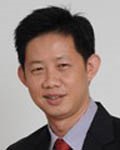The Third International Conference for
“Personal Epistemology and Learning in the Digital Age”
Abstract of Invited Speech
Conceptions of Knowledge Creation in education: A Phenomenography of Singapore Chinese Language Teachers
Seng Chee Tan & Yuh Huann Tan
Nanyang Technological University, Singapore
This talk presents a phenomenographic account of how Singapore Chinese Language teachers interpret the phenomenon of knowledge creation in education. The advent of the Knowledge Age saw increasing demand for knowledge workers in the workforce, which has ramification on education: Is education in schools changing fast enough to prepare our young for the Knowledge Age? Bereiter observed that most transformation in schools focus on structural or administrative changes, but a more radical and necessary change is to transform schools to knowledge building organizations. Consequently, Scardamalia and Bereiter initiated research on knowledge building pedagogy in schools. To implement knowledge building in classrooms, teachers play critical roles in facilitating students’ work and in developing students’ capacity in collaborative idea improvement. Yet, we do not know much know about teachers’ understanding of knowledge creation in education as a phenomenon, a gap that this study attempts to address. This study involved 16 Chinese Language teachers in Singapore, an interesting context of study because Singapore is a multi-racial Asian society comprising about 70% of Chinese, yet English is the lingua franca among the Singaporeans, an indelible influence from its colonial history. This study adopted the phenomenography method, a qualitative research methodology aims at finding and systematising how people interpret the world around them. We chose Chinese language teachers as the participants because they potentially possess an understanding of the different phenomena that reflect the influence of the Chinese culture by virtue of the language they speak and teach. The findings show that the teachers’ conceptions vary along three dimensions: (a) types of knowledge creator and contexts (student or teacher, out of school or in school); (b) knowledge creation as an individual or group efforts; (c) the purpose of knowledge creation (for learning of Chinese language or other purposes). The teachers also conceived the outcomes of knowledge creation as materials, processes, and mental constructs; they talked about benefits of knowledge creation for teachers and students, as well as the enabling conditions and hindrances to knowledge creation. We compare the findings with prominent theories of knowledge creation, including the knowledge building pedagogy; we also hypothesize the possible cultural influence on these teachers’ conception.
Invited Speaker
Prof. Seng Chee Tan (Nanyang Technological University, Singapore)
|
